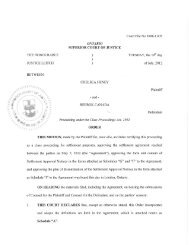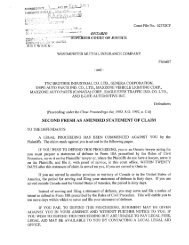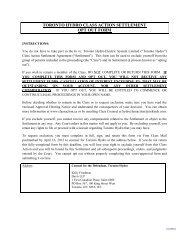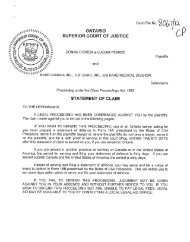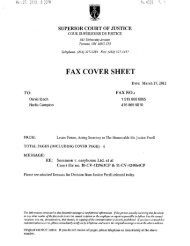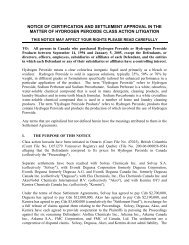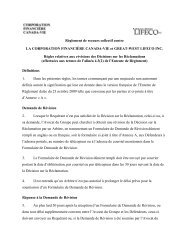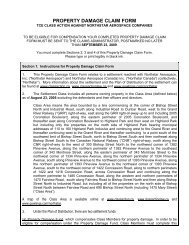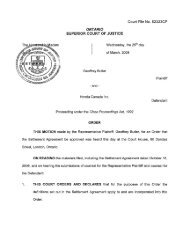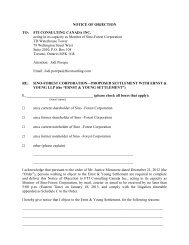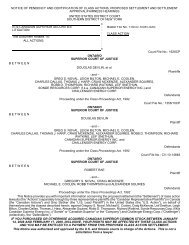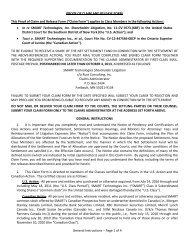Gariepy v. Shell Oil Co. - Classaction.ca
Gariepy v. Shell Oil Co. - Classaction.ca
Gariepy v. Shell Oil Co. - Classaction.ca
Create successful ePaper yourself
Turn your PDF publications into a flip-book with our unique Google optimized e-Paper software.
water pressures, answering the scientific question only starts you on the necessary journey to findthe final answer to the liability question in any given <strong>ca</strong>se. 68 Further, the determination of these common issues would not appear to fulfill the purposesbehind a class proceeding as stated by Chief Justice McLachlin in Western Canadian ShoppingCentres Inc. v. Dutton, supra, at para. 15. First, while a determination of the scientific question mightsuperficially appear to serve judicial economy by avoiding any dupli<strong>ca</strong>tion in the determination ofthat issue, the reality is that it does not avoid the system by system examination required to resolvethe claims of all members of the proposed class. Given the limited role which the scientific questionplays in the overall determination of liability, there is little economy that will practi<strong>ca</strong>lly beachieved. Second, a class action would admittedly spread the costs of the scientific determinationover the entire class rather than requiring one or a few individuals to bear those costs. However,given that the estimates are that replumbing costs would be in the order of $6,000 to $8,000 perhouse, a claim such as this one with five or more plaintiffs would appear to approach a level ofrecovery that would justify a small group of claimants incurring the costs of having the scientificissue determined. Indeed, I would note that a great deal of that work and that expense would alreadyappear to have been incurred for the purposes of this motion. Joinder of claims is an acceptablealternative method to that of a class proceeding for resolving such claims. Third, on the issue ofbehaviour modifi<strong>ca</strong>tion, or a "<strong>ca</strong>lling to account" of the defendants, if these matters are determinedin favour of the class, again, it does not appear, given the limited role that the scientific issue plays,that such a result would necessarily give rise to events that would in turn encourage the defendantsto modify their behaviour. Since there would still remain many individual issues to resolve, thedefendants would not be exposed to any damage award consequent on the determination of thescientific issue and therefore that behavioural tool would be absent. In any event, given the evidencethat none of these defendants produce these products any longer, and that they ceased to do sobe<strong>ca</strong>use of the related litigation expenses incurred in the United States, it would appear thatwhatever "behaviour modifi<strong>ca</strong>tion" might be desired has already been achieved. 69 I conclude therefore that the identified common issues do not rise to the level of commonalitynecessary to satisfy the requirement under section 5(1)(c) of the Act.D. Preferable Procedure 70 Notwithstanding the conclusion that the common issues requirement is not met, it is prudentto still deal with whether a class proceeding would be the preferable procedure to determine thoseidentifiable common issues as opposed to some other procedure. One reason for considering thisissue is the practi<strong>ca</strong>l reality, that is apparent from a review of the decisions on certifi<strong>ca</strong>tion, that theconsideration of preferable procedure is inextri<strong>ca</strong>bly involved with the common issuesdetermination. Indeed, I believe it is evident that my analysis of the common issues above clearlytransgressed into this area. 71 It is true that, as section 5(1)(d) of the Act makes clear, preferability is to be determined onlywith respect to the resolution of the common issues and not with respect to the claim as a whole. Itis also true, however, that the issue of preferability must be considered in the context of the <strong>ca</strong>se asa whole. It is in this regard that the issue of preferability generally involves a consideration of thecommon issues and the degree to which their resolution advances the overall action compared to theindividual issues that remain to be determined. In other words, would the ultimate determination of



